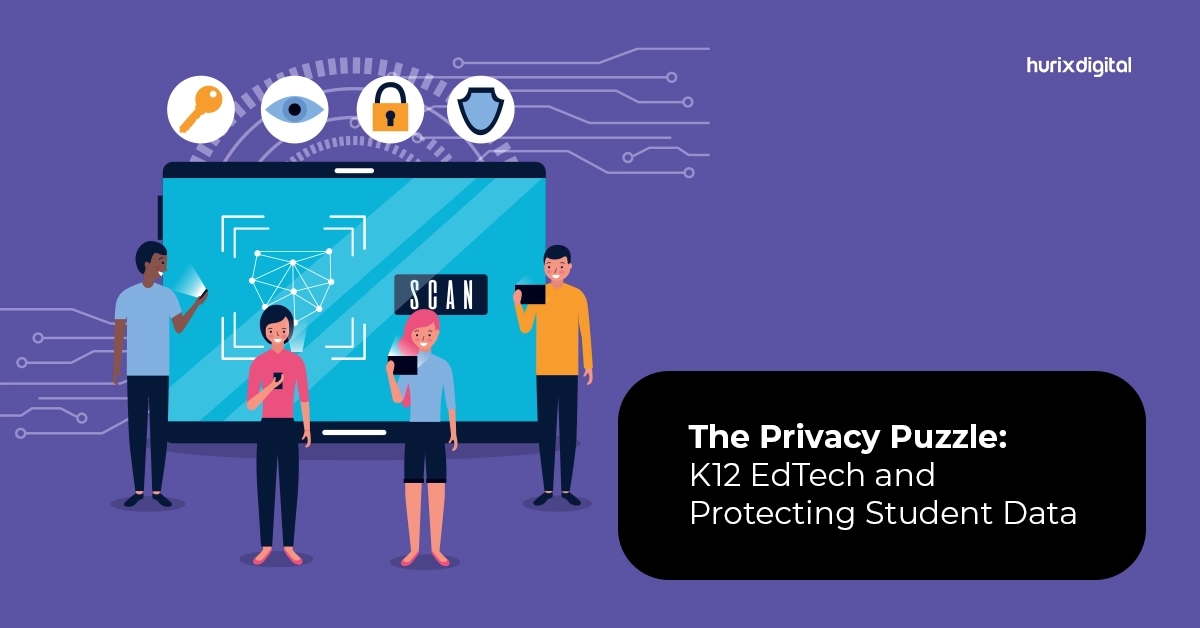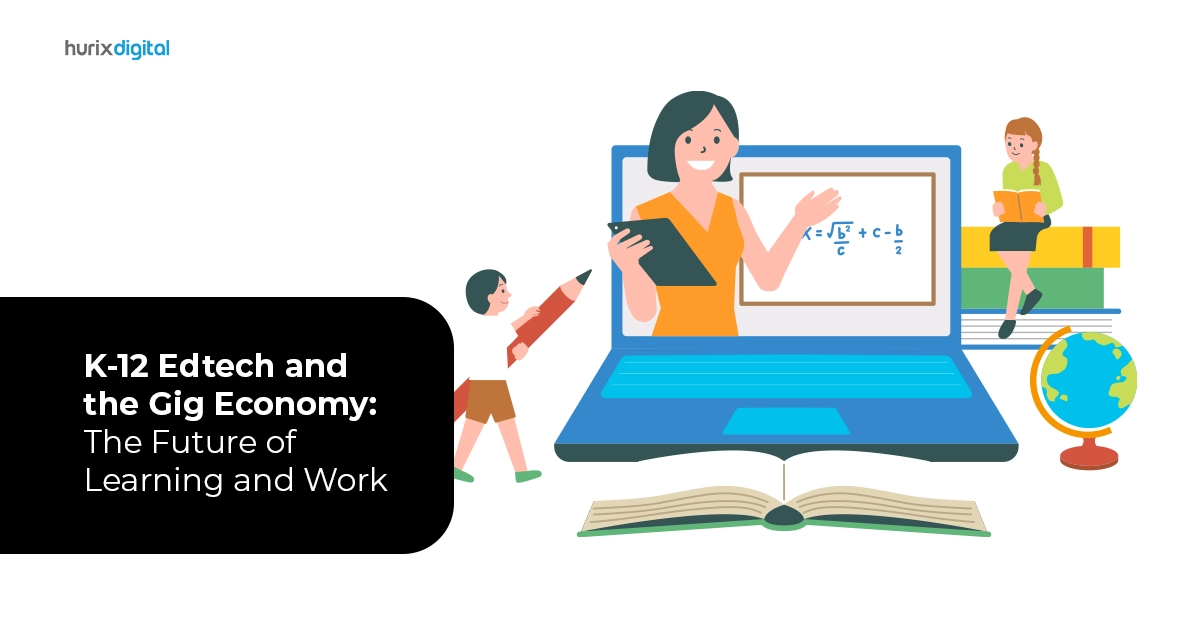Summary
This blog helps you understand the importance of safeguarding student data in the educational sector. From the laws and regulations to the best practices, we've got you covered.
Imagine this: your child’s school uses the latest EdTech to personalize learning experiences. Exciting, right? But pause for a moment and consider: how secure is the data collected through these digital tools? That’s the puzzle we are here to solve.
In the contemporary age, K12 EdTech revolutionizes education, making learning engaging and accessible. But with great innovation comes great responsibility.
The issue of educational technology privacy is a maze. But fear not! With the best practices and Edtech compliance standards in place, you can easily navigate it.
In this post, we’ll take you through the crucial aspects of safeguarding student data in the realm of K12 EdTech. From understanding the importance of privacy to implementing best practices, we’ve got you covered.
Table of Contents:
- The Consequences of Data Breaches: What You Need to Know
- Understanding K12 Privacy Laws in Education
- Safeguarding Student Data: Best Practices in K12 EdTech
- Wrapping Up
The Consequences of Data Breaches: What You Need to Know
Student data refers to any information that can identify, locate, or contact a student. It can include their name, address, email, phone number, date of birth, test scores, behavior, health records, and more.
Since 2022, a shocking 30% increase in cyberattacks targeting K12 schools has occurred. While this data reveals a concerning trend, the consequences of data breaches in the educational sector are even more alarming.
Here are the major implications and consequences of data breaches in the educational sector:
1. Privacy Violation and Emotional Distress
When student data falls into the wrong hands due to a breach, it can violate privacy. This process can expose personal information, academic records, and sensitive details. As a result, students may experience emotional distress, fear, and a sense of vulnerability. This breach of trust can impact their mental well-being and perception of digital learning security.
2. Identity Theft and Fraudulent Activities
Identity thieves can steal and misuse student data for suspicious activities. It includes opening unauthorized accounts, applying for loans, or other scams.
The aftermath of identity theft can haunt students for years, affecting their financial stability and reputation. It can also create significant issues when applying to colleges or jobs that require a clean record.
3. Targeted Exploitation and Cyberbullying
Breached data can make students vulnerable to targeted exploitation. It includes online grooming, phishing attacks, or other forms of digital manipulation. This exposure can lead to emotional trauma and adverse effects on students’ mental health and academic performance.
4. Educational Disruption and Academic Impact
Because of a data breach, educational institutions may face disruptions in their operations. It leads to a loss of valuable learning time and resources.
A lack of student trust can erode their confidence in digital learning security. It hinders their willingness to engage in technology-driven educational experiences.
Also Read: Top 9 Steps to Create Interactive K12 Learning Modules
Understanding K-12 Privacy Laws in Education
As you can see, data breaches can impact students’ emotional, psychological, and academic well-being. Hence, it is crucial to enforce robust security measures. But where do you start?
The first step is ensuring EdTech compliance with the laws governing student data collection, use, and disclosure.
Below are some of the most critical privacy laws in education:
1. Family Educational Rights and Privacy Act (FERPA)
It is a federal law designed to protect the privacy of student education records.
- Grants parents and eligible students the right to access, disclose, or review their educational records.
- Limits access to and sharing of records by school officials and third parties. It bans unauthorized access without consent or lawful consent.
2. General Data Protection Regulation (GDPR)
It is a European Union law protecting the privacy of individuals’ data in the EU.
- Concerns EdTech providers that offer services to EU students, regardless of location.
- Gives individuals the right to request the erasure of their data under certain circumstances.
- Mandates data controllers to notify authorities of breaches within 72 hours of awareness.
3. Children’s Online Privacy Protection Act (COPPA)
This federal law protects the privacy of children under the age of 13 who use online services.
- Directs online service providers to get verifiable parental consent before collecting, using, or disclosing personal information.
- Mandates setting robust security measures and deleting personal data when no longer needed.
Safeguarding Student Data: Best Practices in K12 EdTech
Below are the best practices to safeguard student data in K12 EdTech:
1. Implement Cutting-Edge Encryption
Use robust encryption methods to safeguard sensitive student information. Also, end-to-end encryption ensures that information is only accessible to the sender and intended recipient.
Additionally, implementing end-to-end encryption ensures that data remains encrypted throughout its entire journey, from sender to recipient, minimizing the risk of interception or eavesdropping.
2. Ensure Enhanced Access Control
Enforce stringent access controls based on roles and responsibilities within the K12 institution. It is crucial to limit access to student data to only those personnel who require it for their specific roles.
Implement role-based access controls to ensure that educators, administrators, and other staff members only have access to the information necessary for their job functions. This reduces the likelihood of unauthorized access and protects sensitive student data from being mishandled.
3. Enforce Multi-Factor Authentication (MFA)
Integrate MFA protocols to add a layer of security. This approach requires users to provide many verification forms before accessing student data.
Use a combination of passwords, SMS codes, and biometric scans to access the student information system. It will fortify access control measures.
4. Adopt Data Minimization Strategies
Try to restrict the collection and retention of student data to only what is necessary for educational purposes. It will lower the risk associated with unnecessary data storage.
Collect only essential student information essential for registration and academic purposes. It will lower the risk associated with unnecessary data storage.
5. Assure Regular Data Purging
Review and purge obsolete student data to remove unnecessary information. It will reduce the likelihood of unauthorized access to outdated or irrelevant data.
Establish a quarterly or annual data audit schedule to purge outdated records. It will ensure the data in your school’s databases is current and relevant.
6. Offer Comprehensive Security Awareness
Conduct regular security awareness training for teachers, students, and parents. With this, you can acquaint them with the value of digital learning security.
Organize annual cybersecurity workshops for teachers and parents. Educate them about the latest cyber threats and how to mitigate them.
7. Foster a Culture of Vigilance
Infuse a culture of responsibility and caution among stakeholders. It motivates them to identify and report suspicious activities or potential security breaches.
Also, make sure to set up an anonymous reporting system for students and staff. It will encourage them to declare any activities or security incidents they encounter.
Also Read: 3 Tips for Introducing Competency-Based Learning into K12
Wrapping Up
In a world where EdTech transforms the learning experience, data security is an absolute must. In light of the potential ramifications of privacy breaches, embracing proactive measures becomes important.
At Hurix Digital, we understand the importance of safeguarding student data. Our cutting-edge solutions fortify the defenses against privacy breaches and boost confidence in digital learning security.
So why wait? Reach out to us today to pave the way for a secure and inspiring digital learning journey in 2024.







